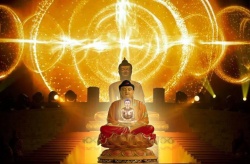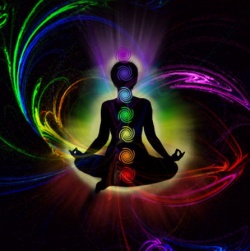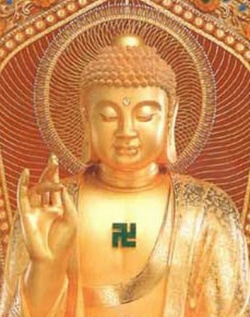Saṁskāraskandha
SAMSKARA (Tibetan: dy byed)
Samskara Skandha means first of all, that the events in the previous 3 skandhas now cause a reaction in the mind, generally based on our experiences from memory.
Experience from memory means, that an understanding, a evaluation or a judgement about the impression, instantly presents itself on this level.
Experience from memory can also mean, that a skill, a knowledge of how to handle situations, or a knowledge about how things work - already developed, habituated and memorised in the mind - manifest itself in the mind.
Thereby suggesting a proper reaction or actually producing such a reaction, depending on your habits. Reaction is caused by memory of some previous experiences of a similar kind to the actual impression, that has now appeared from the third skandha of perception. So, the mind naturally reacts to the sensual or mental impression, according to your experience from memory.
Samskara literally means that which has been put together and that which puts together.
This instant reaction may actually originate from several sources, depending on the nature of the impression, as it is instantly understood, judged or evaluated on this level.
These sources are: the will (as a habit, Sanskrit: cetana), habits, tendencies, abilities, experiences from memory, concepts and passions.
Coherence is now being created. The impression is instantly being interpreted for context. The present is now being linked to the past and the future.
Until samskara skandha, the experience only existed in the here-and-now. Now, the experience is understood or misunderstood and reacted to, according to your experiences from memory.
A habit is called a samskara, habits are called samskaras in plural. So all these samskaras are the patterns by which we conceptualise our mental impressions and react, as we instantly understand, judge or evaluate these. In this way, samskaras are also our habitual patterns of action.
Habitual patterns of the mind rest hidden, arise spontaneously and disappear from view again in a very particular way. They arise as sudden mirror-like reflections of meaning imposed upon the mental impression from the third skandha.
They so to speak, almost live their own lives in the mind, or you could say, that samskaras exist in their own unconscious way, and make up our autobiography and our luggage for reincarnation.
These patterns are the only things, that we take along with us from this life into the next, when we die - also those, that we do not like...
Samskara skandha is also translated as as: ideation, memory and mental formations. Samskaras may in general be categorised as reactionary patterns. If we have to translate the term with only one word, it will be: will, habits, tendencies, concepts, abilities, experiences from memory and passions. I therefore do not translate the word samskaras but use it as a technical term, because it covers so much.
It means both composition, connection and that, which makes the connection. So it is both existing patterns in the mind as well as pattern-creation.
The patterns of the mind can also be described as states of mind in the general meaning of the word, in that the concepts, passions and so on embrace the impressions from the previous skandha, and attach themselves to these.
That is so, as a result of of the very mental processes themselves, based on the predetermined structure of the mind.
First impression, then reaction - instantaneously, just like a light hitting a mirror reflect back at once, leaving actually no time at all for conscious intervention.
You should also note, that if you want to interfere consciously, you have to get used to do it first.
It will not work, if it is not a habit in itself. Formal meditation is the best method for just that.
In this way, among samskaras are also the so-called veils of ignorance (Sanskrit: avidya), karma and passion, that hide the Buddha-nature from immediate recognition, because they instantly arise in connection with any experience on this level.
So samskara skandha is always distorting the impressions, until you gain insight and wisdom.
The central point of samskaras is the will (Sanskrit: cetana), that organises all the other habits, concepts, abilities, tendencies, experiences from memory and passions.
Please note, that cetana is the will-as-a-habit. Cetana is of course also any ill-will, that has established itself.
The free will is more or less an illusion as something completely free, because it is always based on concepts.
Take for instance the concept of freedom.
In this sense, samskaras are always prejudicial.
Without concepts, you do not understand anything, and then you do not will anything.
Then you do not know, how to understand whatever, or what to do about it.
So, good and beneficial concepts and habits as well as kindness, are precious to gather and grow, because they will then become your habitual reaction.
The problematic thing about samskaras is, that we create them in a conscious effort, when we build a habit, but after that, they function on their own.
Watch for instance, how very small children learn to walk.
We are born with some samskaras, that define all sentient beings as well as some, that are the specific human characteristics.
They kind of lie dormant in the mind as more or less unconscious tendencies and talents, and are being released into immediate reaction, when they are stimulated by the impressions from the third skandha.
Unless of course, we consciously interfere and cultivate other habits, or if we consciously chose to let go of, what we usually do, and get used to do that.
Since these habitual patterns of action and conceptualisation are the reason for our way of understanding or misunderstanding our impressions, they are the cause of karma, which means our actions and their consequences, the history of our lives.
What happens here, leave traces in the mind-stream (Sanskrit: santana), that runs from one moment to the next moment and so on, whereby seeds (Sanskrit: bija = seed) are formed in the mind for more or less predictable events in the future.
Our experiences from memory contain all the seeds for future karma.
Samskaras are not inaccessible to us, but they work in a hidden way, and we only notice them, when they manifest by themselves as natural reactions, or we lure them to appear by artificial means.
In this way, they are both unconscious luggage and potential content of the consciousness. Samskaras are also designated as mental events. That is just another way of saying mental states.
There are lists of them. The common count (from Asanga) is 51 samskaras.
Of course, there are many more. The 51 have to do with the work on Enlightenment.
Samskaras are all the things, that we do, without thinking about, how we do it. Samskaras are both helpful and an obstacle to enlightenment.
They are not only our tendencies, talents and passions, but they are also our limitation.
Every time we have to accustom ourselves to new things and new ways of doing stuff, it is a tiresome conscious effort.
Once learned, habits have been formed in the mind, that free us from this attentive exercise.
It is this complete dependency on habits, that limits us and makes us predictable. Without samskaras, we would not understand or comprehend anything, so we do need them, indeed.
In the Dharma we also need to understand and recognise, how they work, in order to avoid their dominance, their distortion and the consequent prejudice. Samskara skandha is the reaction to the impressions of the qualified disturbances in the Skandha of Form.
You will find, that samskaras are number two in the list of mutual interdependence, the 12 links of dependent origination.
(Samskaras mean something slightly different - and yet almost the same - within the Hindu religions. Particularly, it means something about the human character.)



